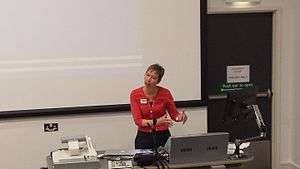Caroline Watt

 |
Caroline Watt's voice
Recorded October 2016 |
| Problems playing this file? See media help. | |
Caroline Watt (born 1962) is a Scottish psychologist and professor of parapsychology.[1][2]
Biography
Watt was born in Perthshire, Scotland. She is a founding member of the University of Edinburgh's Koestler Parapsychology Unit, which she was recruited as a research assistant for in 1986, and she worked there until 2006, when she was appointed as Senior Lecturer in Psychology at Edinburgh University.[1] She has also been Perrot-Warrick Senior Researcher since 2010 and in 2016 she took up new position as Edinburgh University’s second Koestler Chair of Parapsychology.[3][4]
She obtained a PhD in psychology, supervised by the parapsychologist Robert L. Morris.[2]
She has coauthored the fifth edition of “An Introduction to Parapsychology,” which as of 2010 was the most frequently adopted text by those presenting academic courses on parapsychology and anomalistic psychology.[5]
Near-death studies
In 2011, Watts with the neuroscientist Dean Mobbs published a skeptical paper on the near-death experience in the journal Trends in Cognitive Sciences.[6]
In regards to Sam Parnia's near-death research, she stated, "The one ‘verifiable period of conscious awareness’ that Parnia was able to report did not relate to this objective test. Rather, it was a patient giving a supposedly accurate report of events during his resuscitation. He didn’t identify the pictures, he described the defibrillator machine noise. But that’s not very impressive since many people know what goes on in an emergency room setting from seeing recreations on television."[7][8]
Selected publications
- Mobbs, D. & Watt, C. (2011). "There is nothing paranormal about near-death experiences: How neuroscience can explain seeing bright lights, meeting the dead, or being convinced you are one of them". Trends in Cognitive Science, 15, 447-506.
- Easter, A. & Watt, C. (2011). "It's good to know: How treatment knowledge and belief affect the outcome of distance healing intentionality for arthritis sufferers". Journal of Psychosomatic Research, 71, 86-89.
- Irwin, Harvey J. and Watt, Caroline A. (2007) An Introduction to Parapsychology, 5th edition. ISBN 978-0786430598.
- Rabeyron, T. & Watt, C. (2010). "Paranormal experiences, mental health and mental boundaries, and psi". Personality and Individual Differences, 48, 487-492.
- Watt, C. (2006). "Research assistants or budding scientists? A Review of 96 undergraduate student projects at the Koestler Parapsychology Unit". Journal of Parapsychology, 70, 335-356.
- Watt, C., Watson, S., & Wilson, L. (2007). "Cognitive and psychological mediators of anxiety: Evidence from a study of paranormal belief and perceived childhood control". Personality and Individual Differences, 42, 335-343.
- Wiseman, R. & Watt, C. (2006). "Belief in psychic ability and the misattribution hypothesis: A qualitative review". British Journal of Psychology, 97, 323-338.
- Wiseman, R., Watt, C., Stevens, P., Greening, E., & O’Keeffe, C. (2003). "An investigation into alleged ‘hauntings’". British Journal of Psychology, 94, 195-211.
- Watt, C. & Wiseman, R. (2002). "Experimenter differences in cognitive correlates of paranormal belief and in psi". Journal of Parapsychology, 66, 371-408.
References
- 1 2 "Dr. Caroline Watt". Parapsychological Association.
- 1 2 "Biography for Caroline Watt". Koestler Parapsychology Unit.
- ↑ "Becoming Edinburgh’s second Koestler Chair of Parapsychology". Koestler Parapsychology Unit.
- ↑ "Koestler Chair of Parapsychology". Edinburgh University.
- ↑ Sturgess, Kylie (March 2010). "A Skeptic Gets Schooled: An Introduction to Parapsychology". Skeptical Briefs. Vol. 20 no. 1.
- ↑ Choi, Charles Q. (12 September 2011). "Near-Death Experiences Explained by Science". Live Science. Retrieved 16 February 2017.
- ↑ Hill, Sharon (7 October 2014). "One not too impressive study does not prove life after death". Doubtful News.
- ↑ Hill, Sharon (8 October 2014). "No, this study is not evidence for "life after death"". James Randi Educational Foundation.
External links
- "The Search for Evidence", by Caroline Watt, in The Guardian, 2009